LIBYA
In 2025, Libya remains engulfed in political and security chaos, with no credible prospect of crisis resolution. The country remains divided between two rival authorities: in the west, the Government of National Unity (GNU) based in Tripoli and led by Abdelhamid Dbeibah; and in the east, a parallel administration backed by Field Marshal Khalifa Haftar and the House of Representatives seated in Tobruk. UN-led negotiations have failed to produce national elections, and institutional divisions are deepening.
Real power lies with local militias and tribal or ideological armed groups, which compete for control over strategic areas, economic resources (oil, customs posts, roadways), and migration routes. The south, vast and loosely governed, is a hotspot for arms, drugs and human trafficking, as well as recurring clashes between Tuareg, Toubou, and Arab groups.
In the east, Khalifa Haftar maintains authority with support from Russian forces (including Wagner-linked elements), the UAE, and Egypt. In the west, Tripoli is controlled by militias allied with the official government, though these groups often clash violently and unpredictably. Several such militia conflicts erupted in densely populated areas of the capital in 2024.
The humanitarian situation is dire: hospitals are in ruins, electricity and water supplies are intermittent, and living conditions for internally displaced persons and migrants are appalling. Migrant detention centres—where torture, rape, and extortion are common—continue to operate, despite international condemnation.
The oil sector remains the country’s only major economic drivers, but blockades, sabotage, and embezzlement have stalled any sustainable recovery. Critical infrastructure is frequently targeted.
The terrorist threat, though lower than during 2015–2017, still exists. Islamic State elements remain active in southern and central Libya, particularly around Sebha, with regular reports of kidnappings, assassinations, and attacks on local security forces.
For foreign nationals, Libya is one of the most dangerous countries in the world. Risks of kidnapping, arbitrary detention, disappearance, and assassination are extremely high, even in government-controlled zones. Virtually no Western consular services are available on the ground.
All travel is strictly discouraged except for humanitarian or diplomatic missions under heavy protection.
